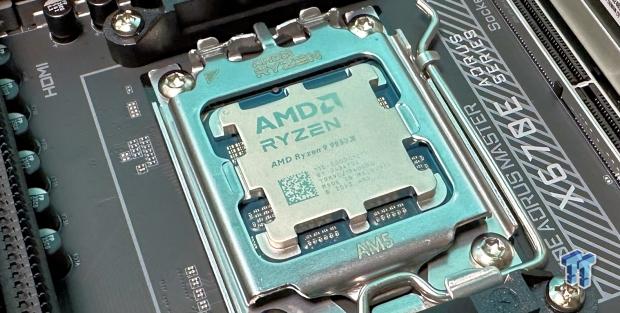
The Bottom Line
Pros
- Uses the same AM5 socket
- DDR5 support at 8000MHz+
- Power consumption reduced
- 32 threads for multi-tasking
- Added integrated GPU
Cons
- Expensive
- Ryzen 9 7950X is cheaper and not much slower
Should you buy it?
AvoidConsiderShortlistBuyIntroduction, Specifications, and Pricing
Well, we are rather spectacularly late to this review, so the cat is out of the bag for most of you. Zen 5 offers another in-socket upgrade for consumers sticking with the AMD AM5 platform with minor upticks in performance depending on your workload of choice. With that, I don't expect this sixteen-core thirty-two thread offering to be the king of gaming, as Kosta, our resident Gaming editor, was kind enough to push out the 9600X and 9700X reviews at launch and already crowned the king of that category. I fully expect this behemoth CPU to pull away regarding system workloads, including applications like CrossMark and PCMark, and even pure core performance like Cinebench or CPU Profile.
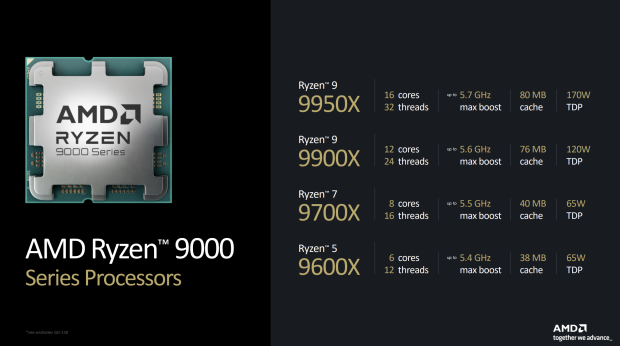
With that, we dive into AMD's marketing materials, with the full launch-day CPU stack listed to the right. This offers consumers four new CPUs. Of course, the 9950X is our focus: a 16-core 32-thread part with a max 5.7GHz boost, 80MB of L3 cache, and a 170W TDP.
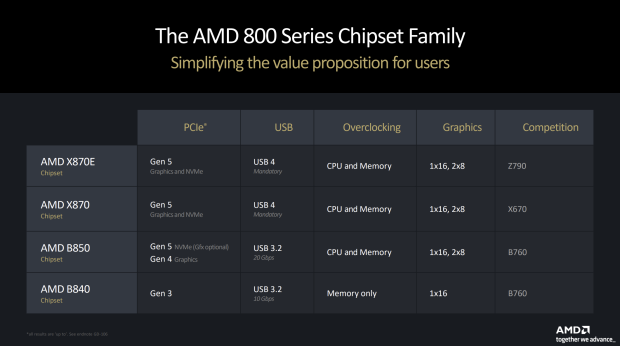
Along with the Zen 5 product stack launch, motherboard vendors are preparing new motherboards with enhanced chipsets that take advantage of a higher ability to overclock memory, AMD saying upwards of 8000MHz+.
These chipsets include the X870E, which takes on Intel Z790 in the current market, while the AMD X870 is set to replace the X670 directly, and two budget chipsets, B850 and B840, can offer low-cost entry into Zen 5 offerings. With that, each of these chipsets has mandatory connection options, with both X870 chipsets coming with USB4 at minimum, along with a Gen 5 PCIe for both your 1x16 or 2x8 slot configuration and NVMe slot.
B series chipsets get USB 3.2 connectivity and a mix of Gen 5 NVMe with Gen 4 GPU, or we have the B840, which is Gen 3 across the board. CPU and memory overclocking is available across both X870 offerings and the B850 chipset; the B840 is dumbed down even more with basic overclocking options for memory only.
Pricing
As for pricing, the AMD Ryzen 9 9950X carries an MSRP of $649.

| Today | 7 days ago | 30 days ago | ||
|---|---|---|---|---|
| $552.72 USD | $576.29 USD | |||
| $556.53 USD | - | |||
| $798.98 CAD | $809 CAD | |||
| $799 CAD | $809 CAD | |||
| £558.99 | £564.18 | |||
| $552.72 USD | $576.29 USD | |||
|
* Prices last scanned on 3/6/2025 at 4:23 pm CST - prices may not be accurate, click links above for the latest price. We may earn an affiliate commission from any sales.
|
||||
Packaging and Test System
Packaging and Accessories
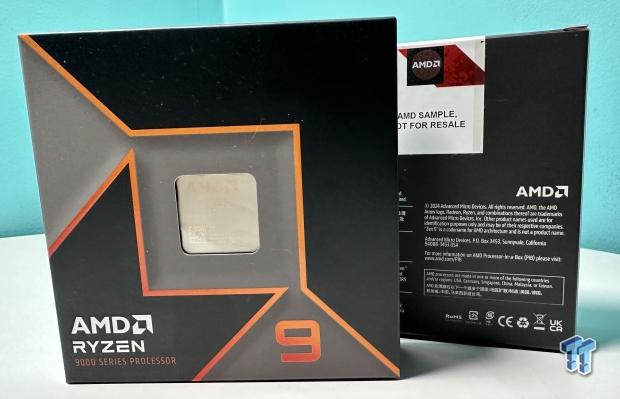
The 9950X and its brother 9900X were delivered together in retail packaging.
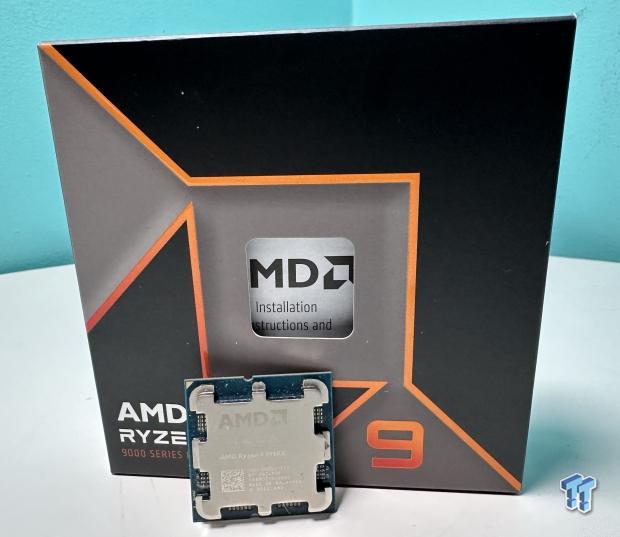
Above is a better look at the CPU packaging and the CPU removed from the retainer.
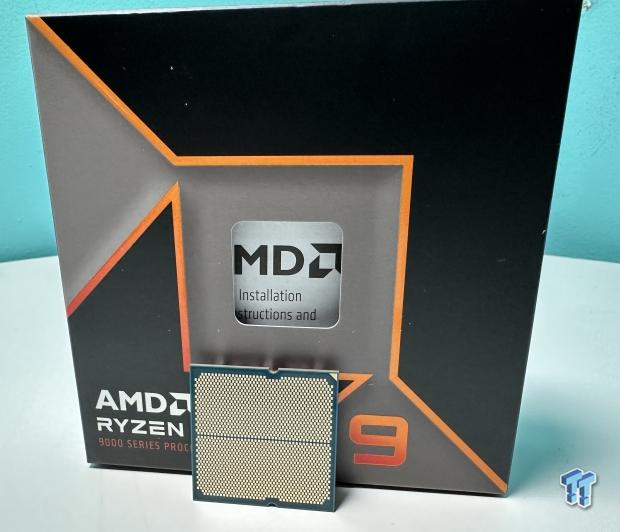
Taking a closer look at the CPU itself, the backside is no different than the Zen 4
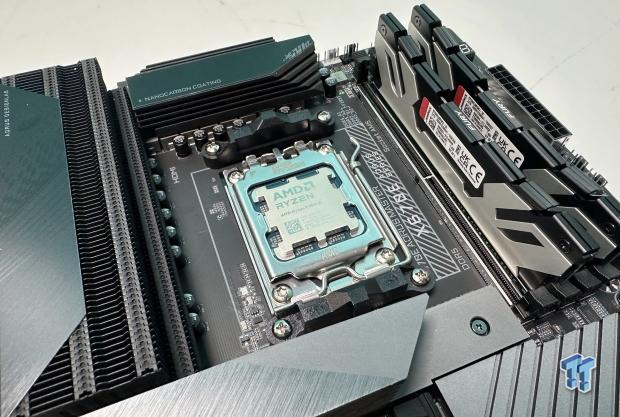
To test the 9950X and even the 9900X, we pulled out our X670E AORUS Master and populated it with a Kingston Fury kit at 7600MHz.
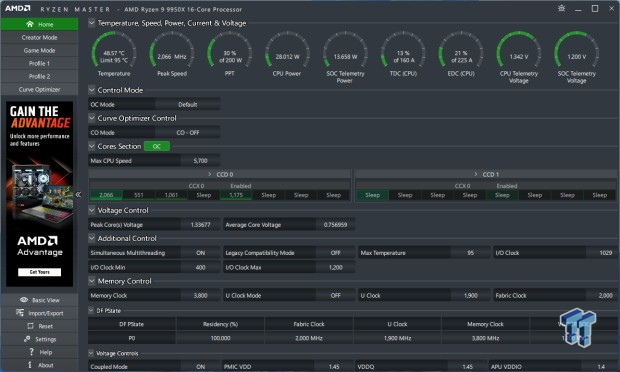
Ryzen Master is an AMD software platform for tuning Zen series processors within Windows. As you can see above, it offers many performance metrics to track your CPU's performance as you tune in and even allows profiles on the side panel to save your progress.
AMD CPU Test System
- CPU: AMD Ryzen 9 9950X - Buy from Amazon
- GPU: NVIDIA RTX 4070 Ti - Buy from Amazon
- RAM: Kingston Fury 7600MHz - Buy from Amazon
- Cooler: EKWB Nucleus 240 - Buy from Amazon
- OS Storage: Crucial T705 2TB - Buy from Amazon
- Power Supply: Corsair HX1500i - Buy from Amazon
- OS: Microsoft Windows 11 Pro - Buy from Amazon
Cinebench 2024, AIDA64 and CrossMark
Cinebench 2024
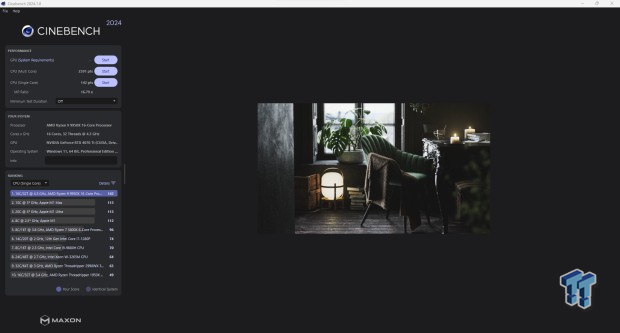
First, we have our raw data for the 9950X, which gave us a 142 single-core score and a 2351 multi-thread score.
CrossMark
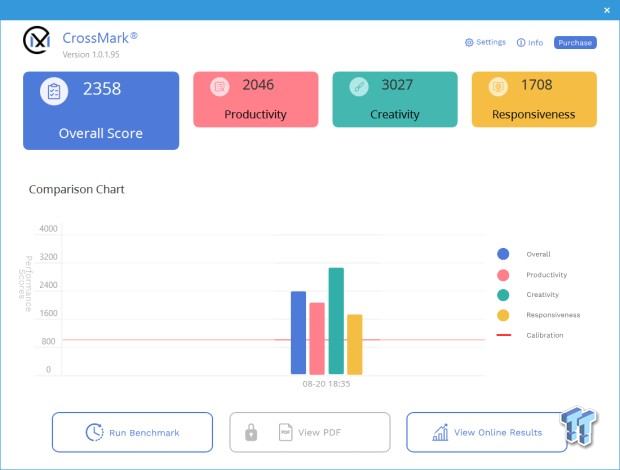
Crossmark scored 2358 overall, with creativity picking up a touch over 3000, the first for our testing.
AIDA64 Memory
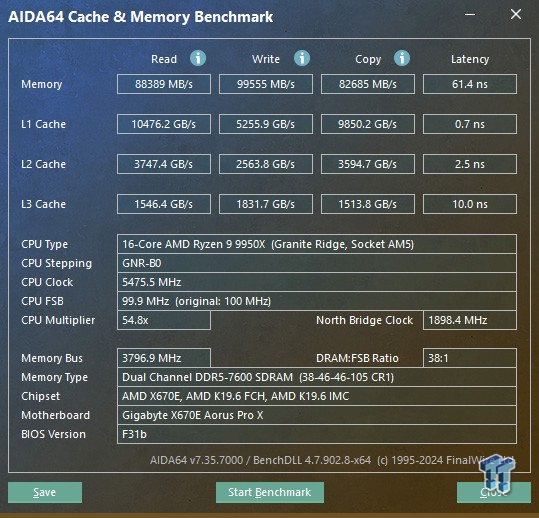
Memory bandwidth landed at 88K, 99K, and 82K, all legitimate performance from the 9950X. Latency, too, stayed rather low at 61ns.
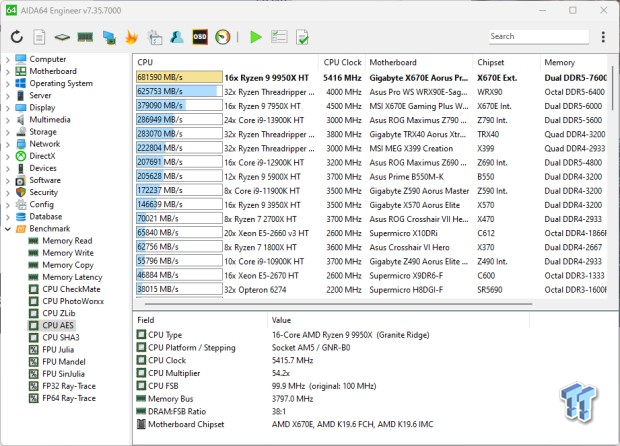
9950X was a beast in AES, scoring an amazing 680K points in this workload.
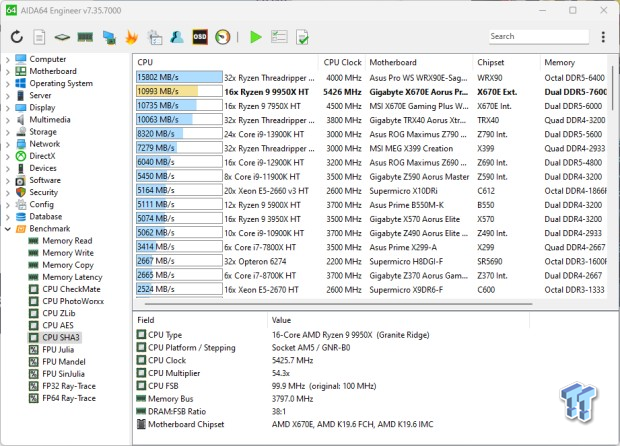
We also hit 10K for the first time with SHA3, thanks to the 9950X.
PCMark and 3DMark
PCMark
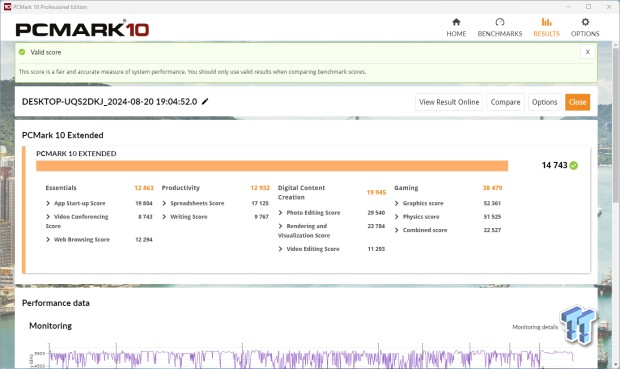
Running PCMark extended, we picked up 14743 overall, possibly the highest score I've seen with our current test setup.
3DMark
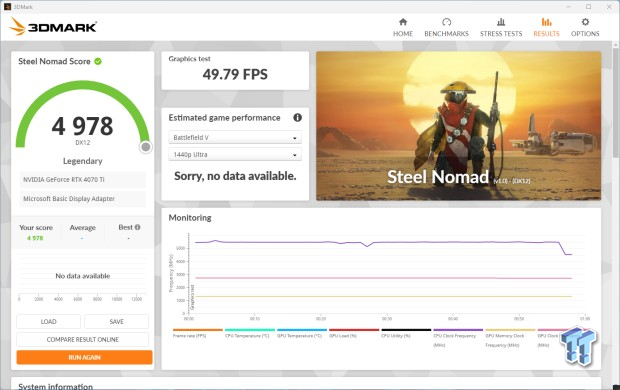
Steel Nomad gave us solid performance with the 9950X and our 4070 Ti. With our configuration, a score of 4978 reached legendary status.
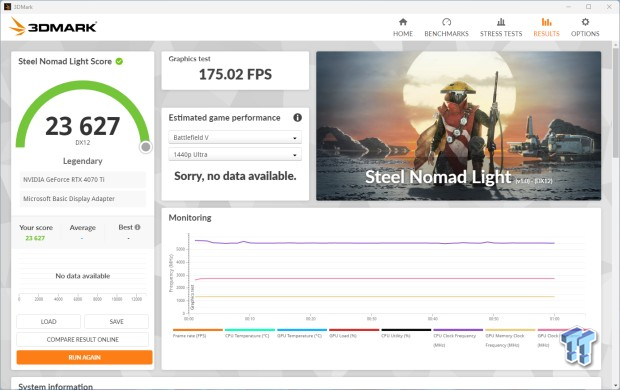
Even though it was still legendary, Steel Nomad Light was a touch better. We reached 23627 with DX12 at 175 FPS.
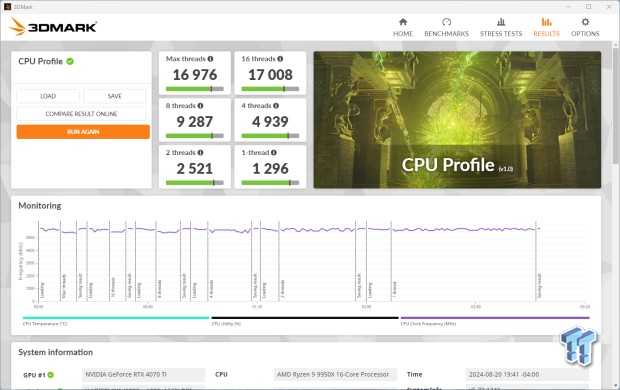
CPU Profile landed us a solid 1296 single-thread score while sixteen threads easily ramped out to 17K.
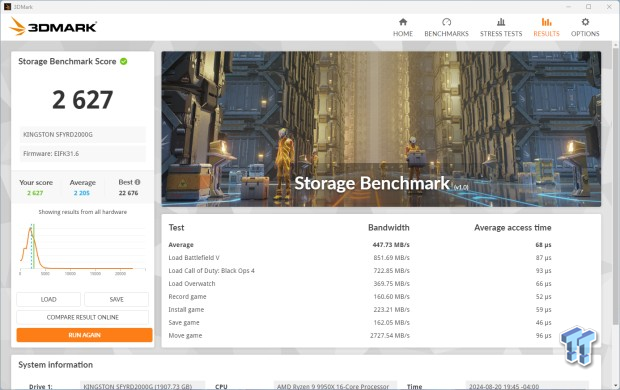
Storage landed at 2627 overall, with bandwidth upwards of 447 MB/s.
Gaming Benchmarks
Cyberpunk 2077
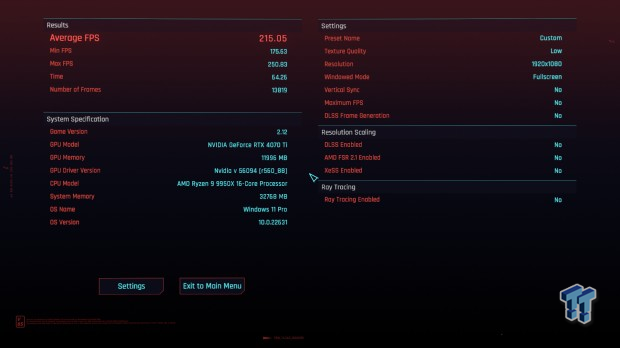
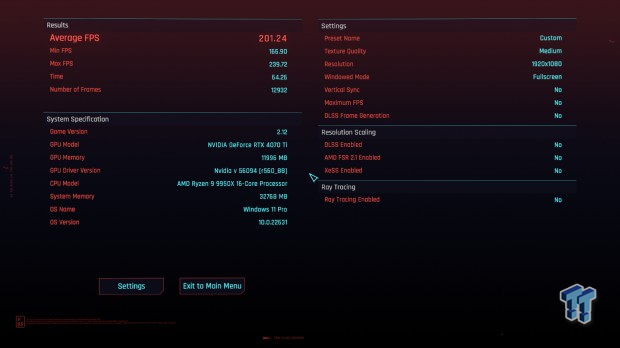
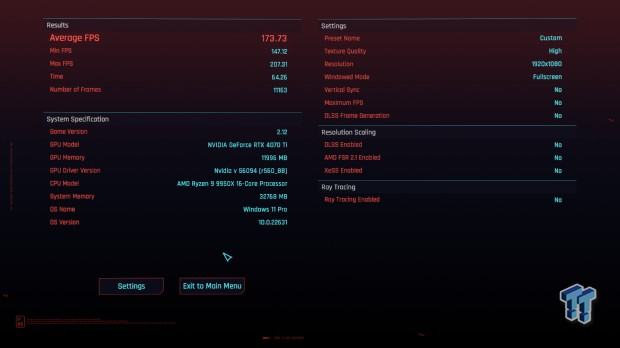
CyberPunk was tested at 1080p using presets with low, medium, and high profiles. Our low preset results, seen above, netted us a fantastic 215 FPS with our RTX 4070 Ti. The medium profile is slightly lower at 201 FPS, and the high landing is 173 FPS.
Forza Motorsport
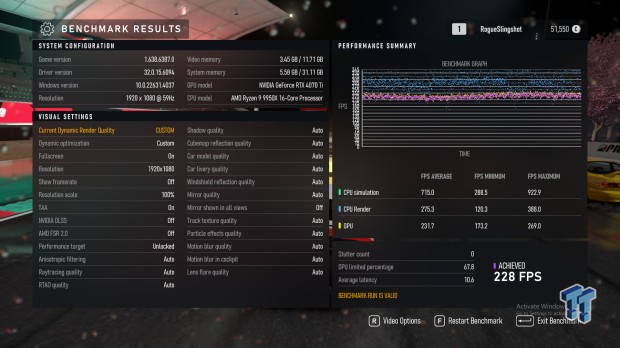
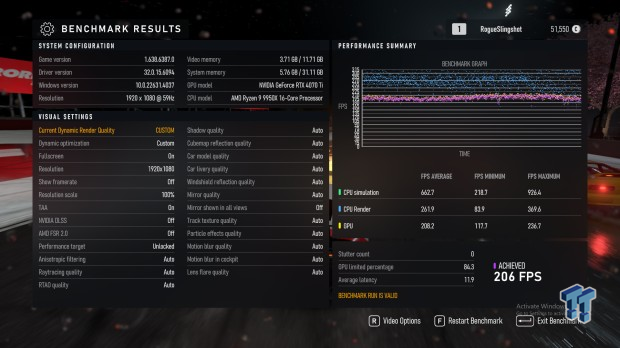
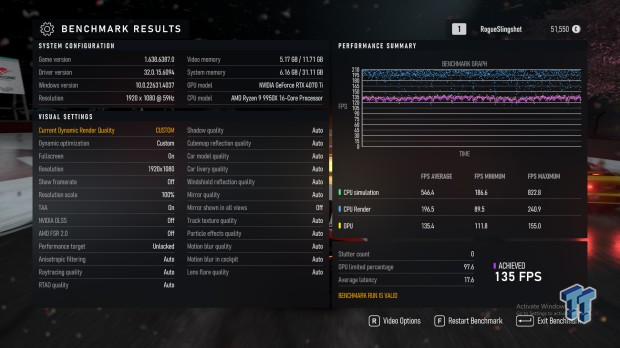
With Forza, we are using the 1080p resolution once again with the same high, medium, and low presets. As expected, the low preset netted us an amazing 228 FPS, as seen above, followed by the medium preset, which picked up 206 FPS in testing. High was also surprising, but it put the biggest stress on our card; we ended up with 135 FPS.
Ashes of the Singularity
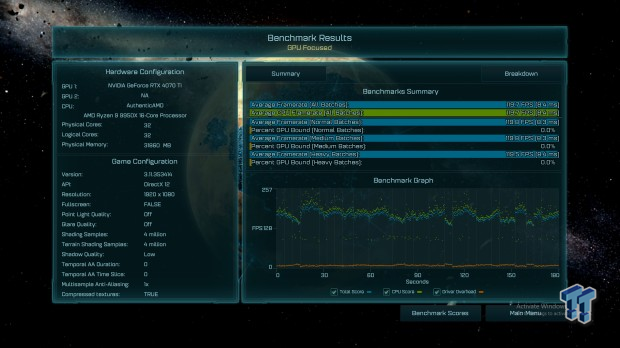
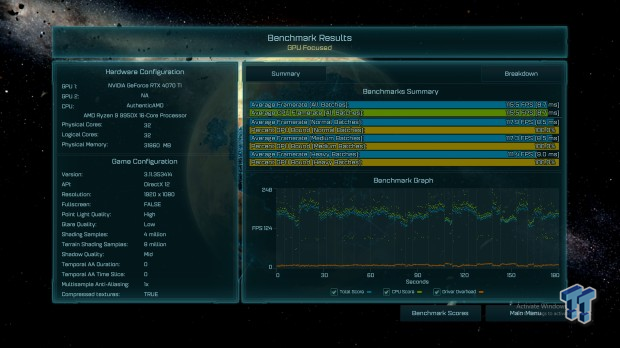
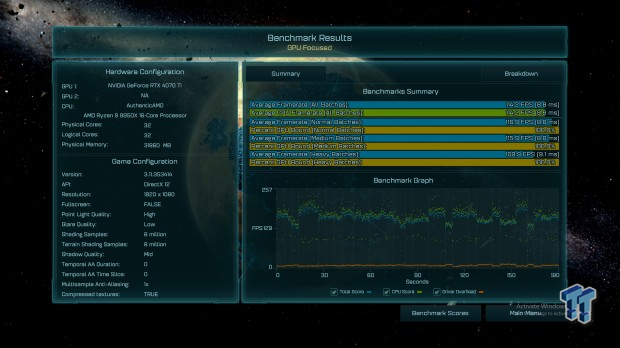
When I got into Ashes, my performance didn't fluctuate too much. In fact, from low to high, we have a range of maybe 6 FPS, with the low preset bringing 119 FPS to the table and the high coming in at 114 FPS.
Charts/Comparisons and Final Thoughts
Charts/Comparisons and Final Thoughts
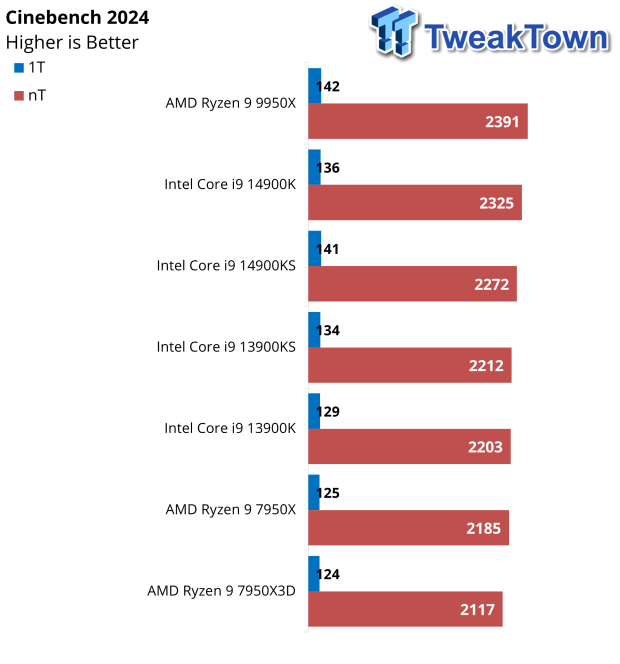
We have a few charts comparing the 9950X to the last few Intel flagship offerings and the last Gen 7950X and 7950X3D. That said, we start with Cinebench, where the 9950X is at the top of our charts, beating the 14900K by a sizable 70 points in multi-thread.
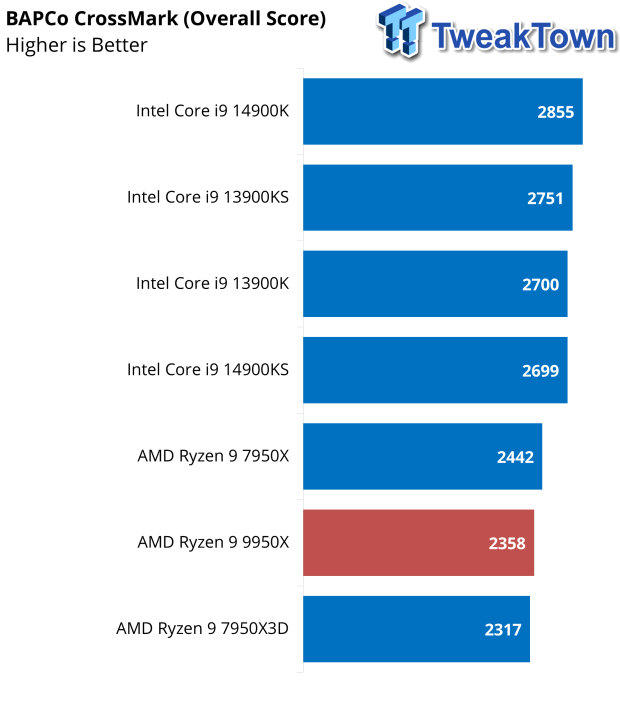
I'm slightly disappointed to see the 9950X lag so far back in a full system benchmark like Crossmark. In this workload, we lost nearly 100 points to the 7950X.
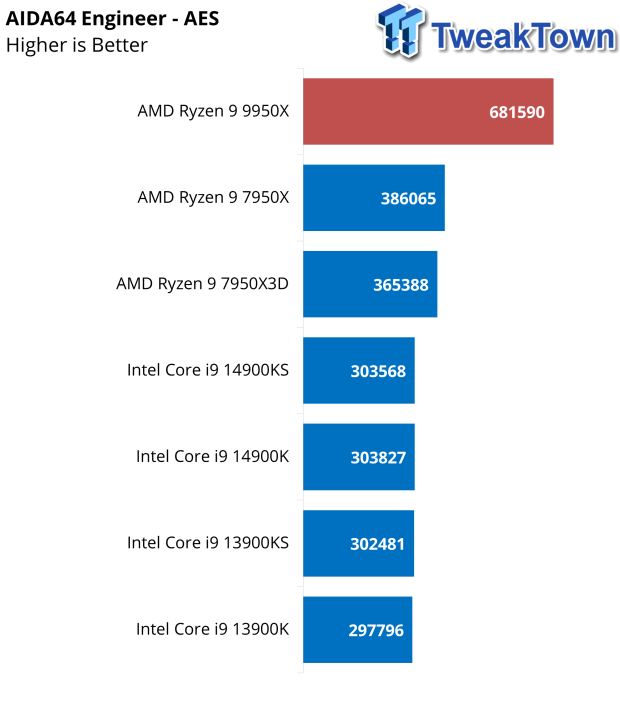
AIDA64 AES and SHA3 comparisons show the 9950X miles ahead of anything Intel and even the last Gen 7950X.
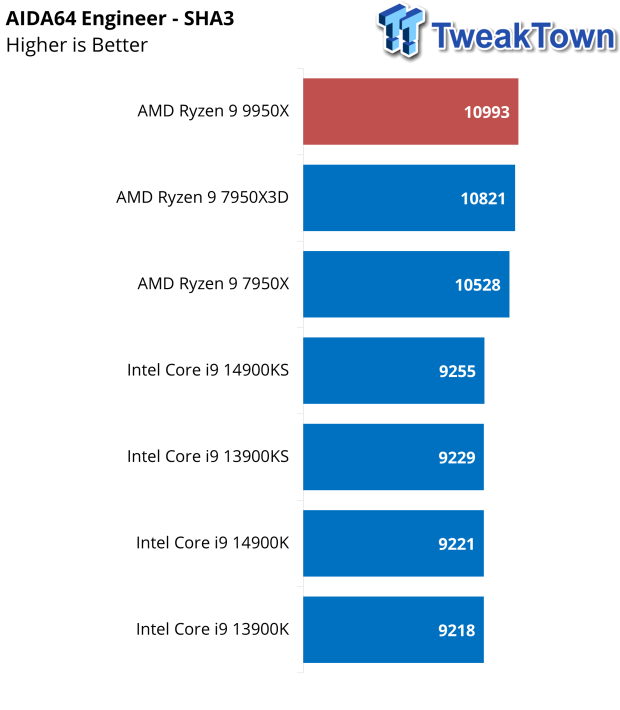
SHA3 was a bit closer, with the 7950X3D neck and neck, with the 9950X and the 7950X not far behind.
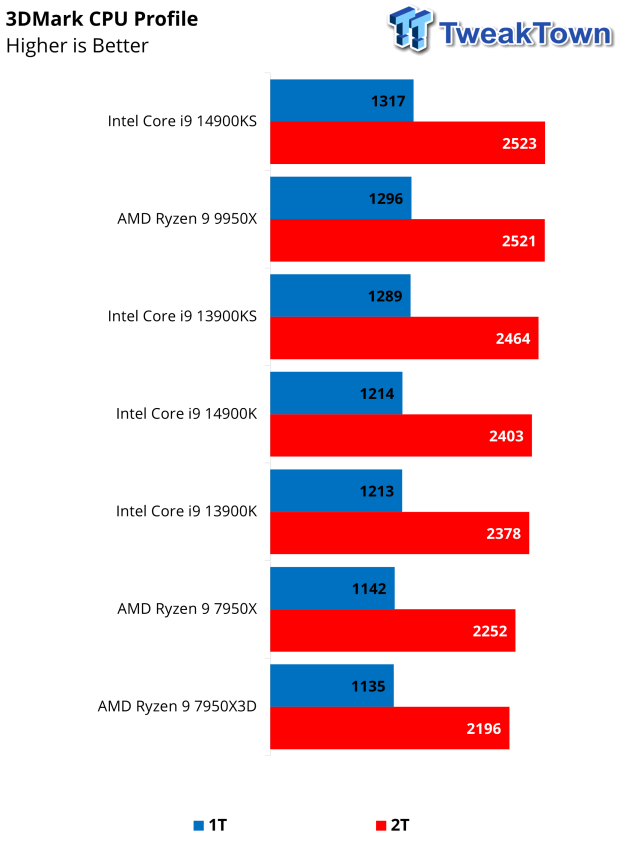
In the CPU Profile, the 9950X is a close second to the 14900KS by two points in the two-thread workload.
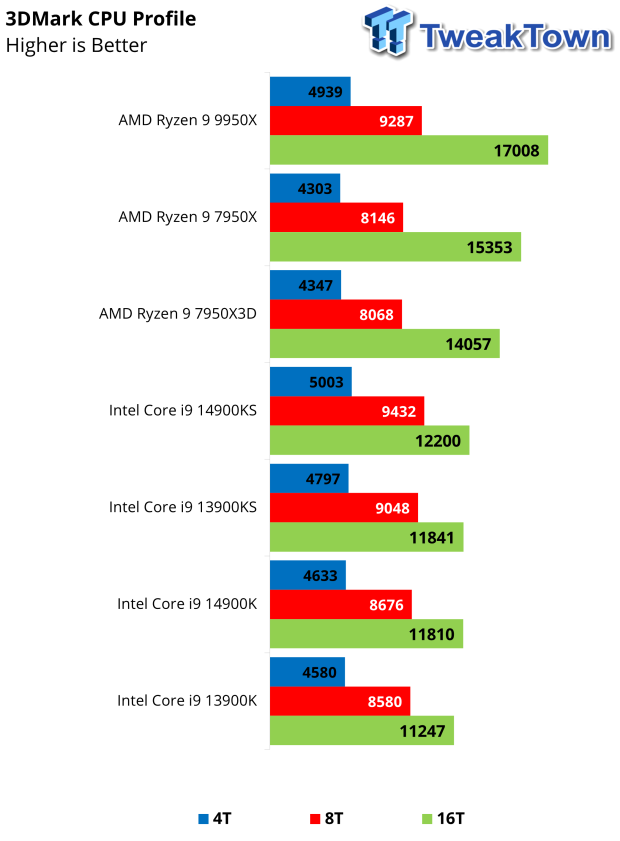
Four, eight, and sixteen threads open up the 9950X a bit more, beating out the 7950X by 2000 points overall, while the closest Intel lands at 5000 points back at 12200.
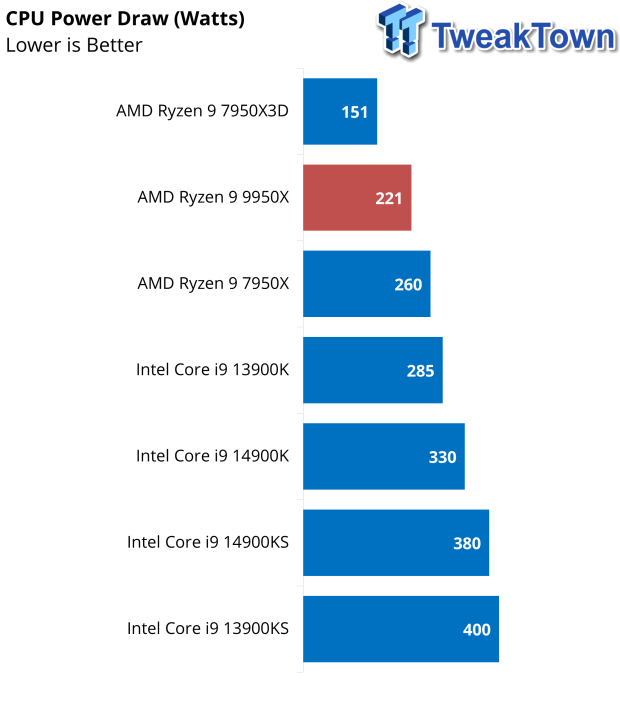
Power draw was improved for those coming from the 7950X, where we measured 260 watts during testing. The 9950X, on the other hand, even with its 170W TDP, gives us an extra 40 watts of efficiency.
Final Thoughts
Admittedly, we spent some time with the 9950X during this review, first having to straighten out motherboard issues, followed by my health issues. That said, I've come away overall impressed by the sixteen-core offering, not so much for its uptick in performance, which does seem to be quite large in some workloads like Cinebench and CPU Profile, but more for its increased efficiency in these workloads dropping peak power down nearly 40W at its highest during our own Cinebench testing.
Gaming workloads all performed flawlessly with the 9950X, as expected. We managed solid FPS across all three presets in Cyberpunk, low and medium, reaching over 200 FPS with ease. When switching the system to the high preset, we still picked up 173 FPS. Forza Motorsport is an interesting title as MS uses a dynamic render model, though we did run it unlocked to put the most stress on the CPU. In these three workloads, we picked up 228 FPS with the low preset and 206 FPS with the medium preset while locking in the highest preset dropped frames to 135 FPS with our RTX 4070 Ti.
Our last gaming workload was Ashes of the Singularity, and we ran testing in DX12 mode with low, medium, and high-performance presets. The RTX 4070 Ti was more than enough GPU for this title, as our performance results were solid across the board, bringing in 119, 115, and 114 FPS in each workload.
As for pricing, the Ryzen 9 9950X is at least $50 cheaper than the 7950X at launch at $649, so there is progress despite increased PC market costs. That said, the price/performance when we compare current market pricing isn't great, considering that the 7950X is going for $510 at the time of writing. Performance is not far behind, and we can use the same AM5 motherboard platforms.

